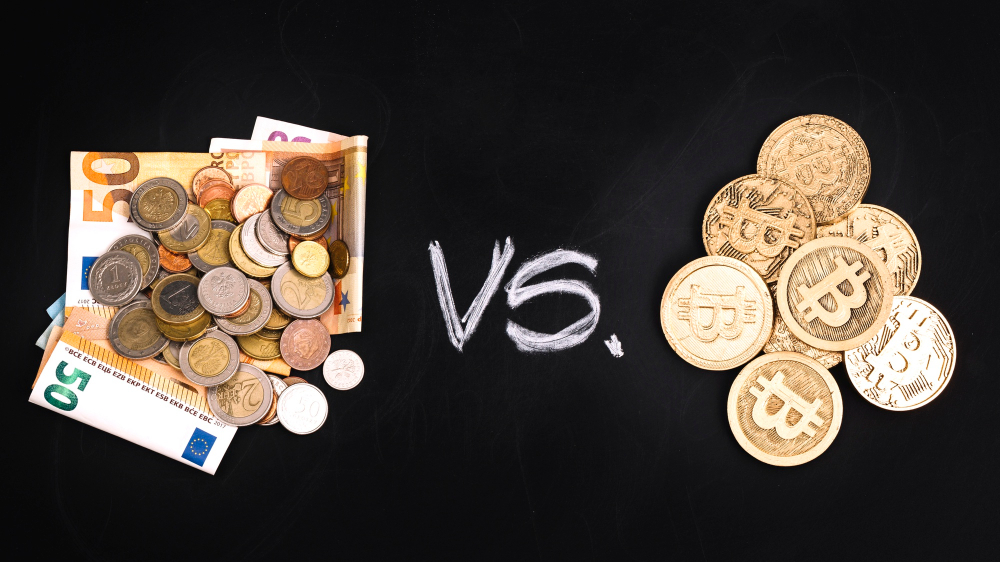Over the last decade, blockchain has evolved from a niche technology behind cryptocurrencies into a powerful tool for transforming traditional finance. Today, blockchain in finance and banking is used to streamline operations, increase transparency, and reduce the reliance on slow, manual, and paper-based processes. As financial institutions face growing pressure to innovate, blockchain is changing how money, assets, and data move across the global financial system.
In this article, we look at the key benefits of blockchain in finance and explain how blockchain is changing finance in practice. From faster settlement and automated compliance to new digital asset models, blockchain offers financial institutions a way to lower costs, improve security, and build more resilient infrastructure.
We will explore real blockchain use cases in finance and blockchain in banking and financial services — including blockchain for cross-border payments, trade finance, KYC and AML, lending, blockchain for insurance, and asset tokenization. You will also see where blockchain fits best in the financial sector and what challenges still need to be solved before large-scale adoption.

Blockchain is a distributed ledger that is shared among multiple computers of the network called nodes. Sounds too tough to understand, doesn’t it? Let’s clear it up. Distributed ledger means that all records in the database exist in multiple places at the same time. When you update the data in any way, the database is immediately synchronized, and all network participants see the update.
Blockchains can store different data types but they are most commonly used for storing transactions. Each record is stored in an independent block, while each block is linked to the one before and after it. These links stay immutable, which means the data in blocks cannot be changed.
Transactions are tracked and recorded in a decentralized network, which means no person or group acts as the network’s authority, on the contrary, all users have collective control.
Blockchain aims at reducing transaction costs and increasing their speed and efficiency. The technology is widely used in diverse industries from oil & gas to retail & eCommerce as it provides investors with lots of opportunities.
Now, let’s see how blockchain technology works. Imagine that you need to send money to your friend. What happens on the technical side? First, you initiate a transaction. Then, the transactional data is entered into a new block. This block is transmitted to every approved party of the peer-to-peer network. The parties are connected by software.
After that, the computers of the network, known as nodes, verify the transaction by utilizing consensus mechanisms. Consensus mechanisms are agreed mathematical formulas that are necessary for validating transactions, establishing data security and integrity, and building trust among all parties. Next, the block joins the chronological chain as an irreversible record. Finally, the transaction is completed, your friend receives the money, and all members of the network can access one shared source of truth.

Blockchain technology is often considered to be a threat to the finance industry, especially to banking and payment functions. However, major banks adopt blockchain by investing in fintech and partnering with each other to make a profit from its benefits. What is more, decentralized blockchains and banks differ a lot. Let’s spot the differences between the banking system and blockchain using the Bitcoin implementation example.
The first and the most obvious point is opening hours. Classic banks usually work on set hours on weekdays. Some of them work on weekends with limited opening hours but all banks are closed on banking holidays. What concerns blockchain technology, it is always open and available no matter what day it is.
Know Your Customer (KYC) rules also differ. To open a bank account and use its products and services, you need to record your identification first as it is required by laws in all countries. Hence, you need at least government-issued identification, a bank account, and a mobile phone to make a transaction. To join the Bitcoin network, you don’t need any identification record. You need just a mobile phone with an internet connection to make transfers.
The next point is transaction speed. It takes at least 24 hours to process usual card payments, clear checks, and make ACH transfers. In addition to this, banks don’t process transfers on weekdays and banking holidays. Bitcoin transactions don’t have such restrictions as they rely only on network congestion. It takes from 15 minutes to over an hour to process Bitcoin transactions.
To make card payments and ACH transfers, clear checks, as well as make Bitcoin transactions, we have to pay fees. Transaction fees for bank operations vary. Some fees are not paid directly by users, and some transfers have set fee amounts. Bitcoin has variable transaction fees, which means users determine how much they are ready to pay as a fee. However, if the fee is considered too low, the transaction may not be processed.
Privacy and security make blockchain technology in finance stand out. Bank account data is stored on the bank server, which means your bank account information is as secure as the server is. If there is an attack on bank servers, then the clients’ accounts may be in danger. Bitcoin can be as private and secure as you wish. You can buy digital assets anonymously and use cold wallets to store them.

Improving Transparency
The main benefits of blockchain in finance and banking start with transparency. When companies do not use blockchain, each organisation stores information in its own unconnected databases. Blockchain technology in finance allows for increasing transparency as it uses a distributed ledger, which means all data and transactions are recorded in the same way in multiple copies of the ledger stored throughout the network. Each record is immutable and has a timestamp so that all participants of the network can view the entire transaction history.
Adding Security
Utilizing blockchain in finance allows you to protect your sensitive data from fraud and other kinds of illegal activity. Payments and money transfers made on blockchain are faster, safer, and more traceable compared to the ones in traditional banking. The technology has a distributed consensus-based architecture that eliminates the need for intermediaries to process transactions. All data is stored across the nodes of the network, which makes it extremely hard for hackers to view data.
Lowering Costs
Blockchain technology has the potential to crucially lower the cost of banking services and boost the quality of products. Companies from the financial industry are searching for ways of blockchain implementation so as to overcome speed and cost issues. For instance, blockchain technology in finance allows us to automate some processes related to banking activities such as payment processing and issuing loans. Thus, consumers get notable benefits from utilizing blockchain like the balance between reduced costs for financial services and their automation.
Effective Risk Control
Blockchain enables instant transaction settlement, which eliminates the risk that counterparties are unable to meet their obligations. It may help to save an essential part of the bank’s expenses. Also, blockchain allows for issuing digital securities in less time, at reduced unit costs, and with great customization abilities. As such, digital financial instruments can be tailored to specific investor needs, extend the market for investors, reduce costs for issuers, and minimize counterparty risks.
Instant Settlements
In traditional banking, transactions are done within seconds or minutes, while settlements require more time up to a week or even a month. Using blockchain in banking and finance provides the solution to the issue by optimizing settlements. Now, transactions are settled instantly as the technology eliminates the need for lots of middle office and back office bank workforce. Thus, financial enterprises will benefit from blockchain implementation and save a substantial amount of time and money.

Better Auditing
All blockchain transactions stay immutable when blocks with data join the chain. As a result, it is easier and faster to perform blockchain audits than standard ones. Auditors don’t have to gather financial statements from clients as blockchain allows them to view all transactions on public ledgers. Also, blockchain builds an audit trail for assets. It allows for tracking their provenance, sharing proofs directly with customers, and reducing risks of counterfeit goods and fraud.
Trust
As it was stated before, there is no central authority in blockchain, so every block with transaction data needs to go through an agreed validation process before it joins the chain. To validate the transaction and add it to the chain, authorized parties of the network use consensus mechanisms. It is almost impossible to make changes to the distributed ledger, so it acts as a single source of truth. Therefore, it is much easier for network participants to manage data, cooperate, and reach agreements.
Programmability
Bringing revolution to money transfers is not the only blockchain application in finance. The technology allows for creating and executing smart contracts. Smart contracts are software used for business logic automation. When pre-set conditions are met, the contract immediately executes and acts in a predetermined way, reducing the chance of human errors. Utilizing smart contacts in the industry provides great abilities to track transactions, both buyer payments and seller deliverables.
High-Performance
Banking and finance enterprises that implement blockchain build their own business networks. Some of them are private, while some of them are of a hybrid type, which means the network combines components of both public and private blockchains or utilizes parts of public and private blockchain solutions. As such, the blockchain network is designed to sustain hundreds of transactions per second and periodic surges in the network’s activity.
Worldwide Accessibility
Unlike traditional banks, blockchain technology doesn’t have working hours and doesn’t need physical points to operate and provide services. Participants of the network don’t have to be located in one city, country, or even on the same continent to keep records, get access to the necessary data, transfer money, and prove asset ownership. Worldwide accessibility is a significant competitive advantage of blockchain that allows it to become adopted by people throughout the world.
Censorship Resistance
Censorship resistance is one more feature that makes blockchain different from regular banks. Traditional banks track everything, and the government may ask them to freeze accounts or assets as well as stop processing certain transactions. Censorship resistance in blockchains guarantees that transactions will run through as long as all the predetermined criteria are met. It makes certain that no third party like the government or any other organization is able to affect or change blockchain transactions, regardless of the power they have.

Even though blockchain brings substantial advantages to the finance industry, there are several risks connected with its implementation. First, blockchain technology may reduce or remove transaction fees. The fees are a significant part of the income that traditional financial institutions earn as people rely on banks and third parties to process money transfers.
Utilizing blockchain in the finance industry may help to get rid of intermediaries such as banks when it comes to transferring money. Hence, if there are no third parties, there is no need to pay them fees for processing transactions and other related services. Therefore, banks and other financial institutions will have to deal with challenges in volume and transaction revenue.
Blockchain technology also affects the infrastructure that belongs to financial institutions, reducing its importance as it works as a verification mechanism without an institution with full authority in one place.
Another risk for blockchain and financial institutions is blockchain innovation which is constantly moving forward. Changes come too fast for regulations to keep up with them. Hence, prospective laws and policies influencing blockchain may be considered a hurdle when it comes to integrating blockchain into financial services. However, governments and other regulators focus on defining the strengths and weaknesses of blockchain technology to understand the consequences of incorporating it into the finance industry.
Cross-Border Payments
Traditional banks allow us to make both domestic and international money transfers, taking a fee for processing them. With regular banks, domestic transfers take from minutes to several hours to complete, while cross-border payments are usually a matter of at least several days. For instance, when you send money from the US to Australia, the funds go through one or more financial institutions before they finally reach the receiver.
Blockchain technology in finance and banking allows us to transfer funds with a minimum participation of third parties, which makes cross-border payments swift and cost-efficient.
Lending Platforms
Before blockchain was used in finance, there was a need for middlemen to build trust between parties and make transactions happen. Now, when blockchain technology is used in finance, debtors and creditors may deal with each other directly and negotiate rates of interest, installments, transaction duration, and other terms through unchangeable smart contracts.
If the borrower is unable to meet the terms of the agreement, then the smart contract adds up a fee to the actual amount to be paid to the lender. Hence, there is no need for intermediaries as blockchain adds trust to the system itself.
Credit Score
To proceed with an application for a loan, banks and other financial institutions call for an applicant’s credit score. Currently, our credit scores lack mobility, which means they are invalid in a different country. So, there is a need for a common credit score.
Utilizing blockchain to manage credit scores will make the entire system more transparent. The technology provides lenders with access to immutable records of transaction history to see if a person is creditworthy. Smart contracts guarantee that sensitive applicants’ data is secured and won’t be revealed.
Invoice Management and Billing Solution
More and more enterprises turn to digital invoicing. However, companies lack the standards necessary for the streamlined execution of invoice-backed financing.
Blockchain technology in finance allows enterprises to upload invoices with the help of smart contracts. Companies can store different information on blockchain, for example, the amount to be paid, clients’ details, payment due date, etc. When customers pay their bills, smart contracts refresh the status of invoices and send alerts that the customer has made a transfer.
Blockchain in banking and finance may help companies to decide if the person is reliable and safe to deal with.
Fund Investment
At present, fund investment calls for expenses and takes much time as the process includes manual operations with multiple databases. Blockchain in finance allows for keeping data on blockchain, which may add transparency, simplify access to data, and reduce the possibility of human errors and fraud.
Blockchain-powered smart contracts provide investment enterprises with rapid access to user data. Users can choose to share their data or not, who can gain access, and for what purpose. Briefly, blockchain technology in finance has the potential to bring transparency to the fund investment processes.
Government Expenses
Currently, governments throughout the world are turning to new technologies and digital methods to modernize legalization services and processes and establish better relations with their citizens. The development of technologies has helped to make the entire system more reliable by increasing the transparency of public financing processes.
From now on, governments can make use of public blockchains by storing information on government spending. Hence, citizens may trace how much money their authorities spend on cities’ reconstruction, road building, etc., while governments may reduce the risks of corruption.
Political Funds
Another useful blockchain application is assisting political funds in keeping information about the funds they received from the public and then spent. Now, political parties may build trustworthy relationships with their voters as citizens can trace the activity of political parties and make better decisions about them.
Financial Record Keeping
Banks and other financial enterprises may use blockchain technology to keep unchangeable finance-related data such as profits earned, the Multiple of Money (MoM), dividend distribution, financial history, and beyond.
Blockchain-based smart contracts give different shareholders different access rights, which means each shareholder can see only relevant information. For instance, interested parties should have access to public information only, whereas shareholders should gain access to confidential information.
Hence, blockchain in the finance industry allows enterprises to make financial systems transparent.
Stock Exchange
At present, the existing stock market includes such participants as brokers, the stock exchange, and regulators that increase the cost of the system. To boost the system’s efficiency, we can manage the stock exchange using the decentralized approach as blockchain helps to get rid of third-party regulators. We can use smart contracts to create all the necessary regulations and automate them.
Initial Public Offering (IPO)
The Initial Public Offering process is a high-cost one as every ICO requires high-fee services of private investment firms, banks, and venture capitalists. Hence, securities markets are moving towards decentralization. Blockchain technology enables direct and secure interaction between the company and investors, which reduces the cost.
How does blockchain facilitate compliance?
Regulatory compliance is crucial as it guarantees that financial enterprises obey the law, rules, and other regulations related to their business. Keeping up with constantly developing regulations is not that easy, especially when a financial institution operates across borders and is influenced by multiple jurisdictions.
Blockchain may streamline automated data verification and reporting processes, smooth administrative supervision, eliminate errors that appear in manual auditing, improve network governance by creating and applying incentive structures, etc.
How does blockchain impact insurance?
Some kinds of insurance claims like property and casualty ones are liable to fraud. Therefore, claim assessments take time. With blockchain, the time required for claim processing may be notably reduced as the technology allows for streamlining data verification, disbursement, and other processes.
Utilizing blockchain in the insurance industry provides automation facilities like keeping authenticated documentation and KYC data, processing claims using smart contracts, creating custom smart contracts that pay out when a certain risk occurs, and more. Hence, the technology may facilitate claim assessments and reduce fraud risks.

How does blockchain impact trade finance?
Trade finance is still dependent on paper-based processes that are prone to security vulnerabilities. Some transactions can take about a few months as it is necessary to verify documents, process letters of credit, and build trust among stakeholders. Blockchain in trade finance may digitize the entire trade finance life cycle, authenticate documentation, reduce processing time and risks of fraud and human errors, enable more transparent governance, create more efficient financing structures, etc.
How does blockchain impact banking and lending?
Core banking services like loans, mortgages, and payment services depend on bureaucracy, which takes much time. For instance, securing a mortgage for individuals may take up to two months. Blockchain solutions may streamline banking and lending services, automate the disbursement of funds, cut issuance and settlement times, manage assets in real-time, decrease counterparty and operational risks, and many more.

Technology Cost
Utilizing blockchain technology in finance helps users to save money on transaction fees. However, we use the technology not for free. For instance, blockchain validates transactions through the Proof of work (PoW) system, which requires large amounts of computational power. There are millions of computers in the blockchain network and all of them need the power to operate, and we have to pay for it.
Even though the costs of mining cryptocurrencies are pretty high, users don’t stop increasing their electricity bills as they need to validate blockchain transactions. This happens because miners get enough cryptocurrency as a reward to cover their time and money expenses.
Nevertheless, there are some solutions to these issues like mining farms that work on renewable sources of energy like solar power, power from wind farms, etc.
Speed and Data Inefficiency
Let’s have a look at possible blockchain inefficiencies using Bitcoin as an example. To add a new block to the chain, Bitcoin’s PoW system needs about 10 minutes. At that rate, blockchain is estimated to manage about seven transactions per second. Even though there are other cryptocurrencies with better performance, they are still limited by blockchain.
The other problem is that each block can only hold a certain amount of data. It continues to be one of the most critical issues that influence future blockchain scalability.
Illegal Activity
Confidentiality on the blockchain network is a pro and a con at the same time. On the one hand, it protects users from hackers and safeguards their privacy. On the other hand, it enables the performing of illegal activities like money laundering or buying and purchasing illegitimate goods and services on the network. Initially, Bitcoin was used for performing such activities, but most illegal activities are still accomplished through untraceable cash. Blockchain allows everyone to create and operate financial accounts without verification, that’s why it is easy for criminals to do their illegal business.
Lack of Clear Regulation
Members of the crypto community have had concerns about government regulations over cryptocurrencies. In theory, governments throughout the world could prohibit owning cryptocurrencies and participating in their networks. However, as the decentralized network is getting bigger, it is getting almost impossible to put an end to things like Bitcoin.
Nowadays, as leading companies like PayPal allow their users to own and operate cryptocurrencies on the platforms, the concern is not that disturbing.

Now, after we’ve discovered blockchain’s strengths and weaknesses as well as its use cases, let’s have a look at the challenges that companies in the finance industry face when implementing the technology.
The most obvious issue is that switching to blockchain technology requires huge expenses and takes a lot of time. Small finance enterprises may be unwilling to rebuild existing systems and processes.
Nevertheless, to get maximum results from blockchain implementation, the technology needs to be widely adopted. It is an issue for the banking and finance industries as many companies work with each other, and they must use a single transaction processing method. It means that if you need to transfer funds with blockchain, each bank participating in the process needs to have adopted it.
Another challenge that financial companies face is a lack of interoperability among diverse blockchains, which means they can’t communicate with each other. To tackle the issue, there are some blockchain networks in development that focus on creating interoperable solutions like Polkadot and Cosmos.
As we already know, blockchain records are unchangeable. For financial enterprises, it is a strength and weakness at the same time as they often need to adjust stored information. If companies decide to implement blockchain, they will have to modify their methodology.

Even though blockchain has the potential to revolutionize the way we do business, most companies are still testing its applications to their business processes. However, the technology is being accepted by enterprises from the finance industry. Now, let’s see how financial institutions use blockchain benefits in the industry and contribute to the development of the technology.
One of the most popular ways of using blockchain technology in finance is processing payments as it allows companies to protect data integrity, settle transactions almost instantly, and save money. Blockchain-based cryptocurrencies are universal, which means there are no exchange rates and fees for international transactions.
Payment processing giant, Visa, is one of the largest companies in the industry that has started using blockchain. One of the first steps on this way for Visa was investing in a blockchain developer Chain.com. Then, they started utilizing blockchain to make cross-border business-to-business payments. Visa has worked with crypto platforms and exchanges to create and launch cryptocurrency debit and credit cards. Currently, the company has settled cryptocurrency transactions, which means Visa is the first major payment network that did it.
Ripple, one of the most prominent blockchain-based payment systems, promotes efficient money transfers throughout the world by allowing banks, cryptocurrency exchanges, and other businesses to make direct transactions without third-party involvement.
Blockchain technology may also bring revolution to the stock market as it helps to streamline processes, reduce high costs, and eliminate security risks. There are multiple players in a traditional stock market including third-party regulators that process investments. Communication among all involved parties takes time, which brings delays and uncertainty to the investment process.
Blockchain-powered smart contracts and the technology’s decentralized nature can make the investment process faster, more accurate, efficient, and secure. When the investment meets the conditions of the smart contract, it is considered a valid one and can be fulfilled immediately.
Barclays PLC is a transnational bank that has deeply investigated blockchain applications in finance. For instance, the bank has tested smart contracts to find out how to use them in trading futures and options. When stock exchanges started using smart contracts for derivatives, it was revealed that it could reduce the time needed to set up the contracts. Besides, the bank applied for the patent on using blockchain for KYC verification.
Barclays PLC and other banks have invested in the Fnality project that aims at creating cryptocurrency versions of the world’s major currencies and utilizing blockchain to make rapid and cheap transactions.
One more company that uses blockchain solutions is American Express, which is both a payment network and a financial enterprise that provides banking services and loans, and offers credit and charge cards. American Express and Hyperledger have worked on integrating the technology into the Membership Rewards program and tested it with an online grocery delivery platform.
Blockchain allowed the retailer to give more loyalty points to their customers based on the purchase time or the product type. When customers bought products and the purchase met the conditions, the bank gave them loyalty points and billed the retailer through a smart contract. Now, blockchain-powered loyalty programs are popular with businesses from a wide range of industries as they help to retain customers and increase revenue.
Also, the technology has introduced Initial Coin Offerings (ICOs), a modern method of raising capital. ICOs offer blockchain-based tokens that represent ownership stakes in a company. ICOs are gaining popularity as they allow companies to raise funds faster, safer, and more accurately.

Blockchain implementation is not that easy. Nonetheless, financial companies are starting to use the technology as they see its potential and know they may greatly benefit from its advantages. In practice, this is how blockchain is changing finance today: it powers secure payments, reduces paperwork, cuts fraud risk, and opens the door to new business models such as digital assets and tokenization. Blockchain applications in finance also include faster cross-border transfers, automated reconciliation, and more transparent reporting.
To become more widespread and useful for financial enterprises, blockchain still needs to tackle interoperability issues and improve transaction processing at scale. Another important point is the regulatory environment, which may remain quite fluctuating for some time. Governments and regulators are trying to understand and control how blockchain in the finance industry should be governed. Those authorities that find efficient ways to support and regulate blockchain in finance will be able to attract global investments and become leaders in the blockchain economy.
Our experts do not expect the technology to completely replace existing financial systems in the near future. Financial institutions are more likely to test blockchain-based solutions, adapt them to specific needs step by step, and integrate them as an addition to current systems rather than a full replacement.
Financial enterprises need to improve their products and services by bringing innovation and adopting new technologies. The companies that follow the trends and make use of innovation may disrupt the businesses of those that don’t.
Blockchain is gaining acceptance in the finance industry step by step. The technology has the potential to make business operations more secure, efficient, accurate, and cost-effective. Some financial institutions have already implemented blockchain, whereas others are still exploring its use cases. As major players in the industry continue to experiment with blockchain implementation, we are likely to see more blockchain-powered financial solutions in the future.
If you have any questions or brilliant ideas, feel free to contact our experts.